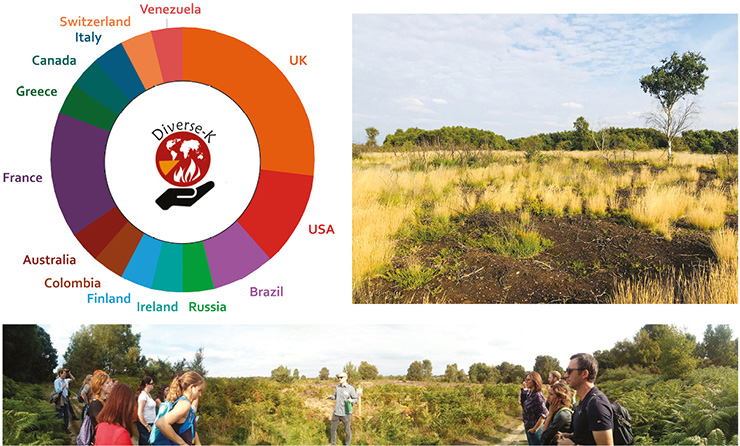- Home
- Publications
- PAGES Magazine
- DiverseK: Integrating Paleoecology, Traditional Knowledge and Stakeholders
DiverseK: integrating paleoecology, traditional knowledge and stakeholders
Colombaroli D, Mistry J, Milner A, Vannière B, Adolf C, Hawthorne D & Global Paleofire Working Group (GPWG2)
Past Global Changes Magazine
26(2)
89
2018
Daniele Colombaroli1, J. Mistry2, A. Milner1, B. Vannière3, C. Adolf4, D. Hawthorne5 and the Global Paleofire Working Group (GPWG2)
Egham, UK, 4-7 September 2018
Integration of ecosystem science and applied research in ecosystem management is a high priority and key challenge for the science-policy interface, as recently highlighted by the Intergovernmental Science-Policy Platform on Biodiversity and Ecosystem Services (IPBES 2018). A more direct involvement of stakeholders and policymakers into the research agenda requires new approaches for knowledge transfer from the academic to the stakeholder community, as also emphasized during previous workshops organized by the Global Paleofire Working Group GPWG2 (Blarquez et al. 2018; Courtney-Mustaphi et al., this issue).
Thirty participants from 15 countries (Fig. 1) met at Royal Holloway University of London, UK, to discuss ongoing challenges on biodiversity conservation and fire policy, considering three approaches: (a) long-term ecology – informing on ecosystem responses to environmental change across regions and timescales (paleoecology-informed conservation); (b) local, traditional, and indigenous-knowledge systems on fire management that maintain biodiversity (community-owned and -driven conservation); and (c) conservation challenges and agendas defined by stakeholders and policymakers (stakeholder-driven research). The combination of long-term ecology with traditional knowledge represents a novel and alternative approach to promote a more sustainable management practice of present ecosystems under current threats, and fosters the dialogue between the different disciplines.
Before the workshop, conservation and fire-management evidence priorities were identified together with the UK Government Department for Environment, Food and Rural Affairs , and included: (1) the impact of changing climate and land use on fire regimes; (2) ecosystem recovery after fires of different severity; (3) the optimum fire regimes needed to achieve management objectives for biodiversity conservation; and (4) the effects of prescribed burning (and other land-management practices) on wildfires. The participants discussed examples of fire policies and relative impacts based on their regional expertise and on a field discussion in Chobham Common (Fig. 1). Different sub-groups then compiled evidence-based case studies on past ecosystem legacies, the role of local ecological knowledge in maintaining landscapes (Mistry and Berardi 2016), post-fire ecosystem dynamics, and burning conditions that optimize biodiversity across ecosystems (Colombaroli et al. 2013). This approach also highlighted potential conflicts in conservation targets for specific regions (natural vs cultural; e.g. Jackson and Hobbs 2009), and the need to anticipate new challenges in a future warmer world (Fischer et al. 2018). The participants produced a first draft of a policy brief summarizing best practices for sustainable ecosystem management, including how transdisciplinary knowledge can inform fire management and policy, and highlighted future priorities to foster effective science-policy knowledge exchange in this region. In addition, a group of early-career researchers focused on the compilation of a systematic review protocol to summarize the available evidence on the effects of climate change and land use on fire regimes.
Adapting fire policy to more sustainable practices for specific regions requires approaches that focus primarily on the most urgent challenges set by policymakers (policy-driven research), in co-production with diverse knowledge and expertise (here paleoecology, cultural geography and policymakers). This dialogue can lead to the implementation of decision tools for policymakers, and further promote the integration of long-term ecology in more applied science (Willis and Birks 2006). The Global Paleofire Working Group, through the Diverse Knowledge framework (DiverseK), will continue to build a strong network of researchers, land managers, practitioners, and policymakers to tackle ongoing challenges in ecosystem management and biodiversity conservation.
acknowledgements
Funding has been provided by PAGES, the Quaternary Research Association (QRA), and Chrono-environnement at Université Bourgogne Franche-Comté. The full meeting program is available at gpwg.paleofire.org/event/focus-group-3-workshop-london-2018. Additional material is on our Twitter account (@diverse_K). The motivation for this workshop was inspired by Cathy Whitlock, the GPWG community (gpwg.paleofire.org) and previous PAGES meetings in 2012 by K.J. Willis and E. Jeffers in Oxford, UK, (PAGES Focus 4 Biodiversity Theme Workshop, pastglobalchanges.org/calendar/1006) and in 2017 in Bern, Switzerland, by H. Fischer, K. Meissner and A. Mix (PAGES Warmer Worlds Integrative Activity workshop, pastglobalchanges.org/calendar/128556).
affiliations
1Centre for Quaternary Research, Department of Geography, Royal Holloway University of London, UK
2Department of Geography, Royal Holloway University of London, UK
3UMR Chrono-environnement (CNRS), Université Bourgogne Franche-Comté, Besançon, France
4Department of Zoology, University of Oxford, UK
5AOC Archaeology Group, Edinburgh, UK
contact
Daniele Colombaroli: daniele.colombaroli@rhul.ac.uk
references
Blarquez et al. (2018) PAGES Mag 26(1): 40
Colombaroli D et al. (2013) Divers Distributions 19: 157-170
Fischer H et al. (2018) Nat Geo 11: 474-485
Jackson S, Hobbs RJ (2009) Science 325: 567-569


